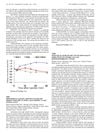 July 2010 in “Journal of Investigative Dermatology”
July 2010 in “Journal of Investigative Dermatology” Scientists found gene mutations that affect hair loss, skin stem cells, and skin disorders, and identified drugs that may help treat blood vessel and skin conditions.
 April 2010 in “The Journal of Urology”
April 2010 in “The Journal of Urology” Human prostate cells produce more WISP1/CCN4 when there's not enough oxygen.
 April 2017 in “Journal of Investigative Dermatology”
April 2017 in “Journal of Investigative Dermatology” Higher leptin levels link to hair loss.
8 citations,
May 2005 in “Fertility and Sterility” A specific gene variation is linked to a higher risk of polycystic ovary syndrome in Caucasian women.
 3 citations,
December 2020 in “bioRxiv (Cold Spring Harbor Laboratory)”
3 citations,
December 2020 in “bioRxiv (Cold Spring Harbor Laboratory)” Disrupting YAP signaling in skin cells leads to scar-free healing directed by specific cell signals.
 November 2023 in “Zenodo (CERN European Organization for Nuclear Research)”
November 2023 in “Zenodo (CERN European Organization for Nuclear Research)” The dataset includes detailed genetic information from mouse skin cells before and after injury.
 November 2023 in “Zenodo (CERN European Organization for Nuclear Research)”
November 2023 in “Zenodo (CERN European Organization for Nuclear Research)” The dataset includes detailed genetic information from mouse skin cells before and after injury.
 July 2020 in “bioRxiv (Cold Spring Harbor Laboratory)”
July 2020 in “bioRxiv (Cold Spring Harbor Laboratory)” Neutrophil extracellular traps slow down hair follicle healing after injury.
 January 2018 in “Journal of Cosmetics, Dermatological Sciences and Applications”
January 2018 in “Journal of Cosmetics, Dermatological Sciences and Applications” Hair transplant surgery can successfully treat hair loss at the back of the neck.
47 citations,
November 2000 in “Archives of dermatology” Pulsed infrared laser can effectively reduce symptoms of pseudofolliculitis barbae.
46 citations,
July 2015 in “Wound repair and regeneration” Keloid scars may form due to changes in skin cell characteristics and specific protein signaling.
 22 citations,
April 2017 in “Cell Stem Cell”
22 citations,
April 2017 in “Cell Stem Cell” Skin wounds can create fat cells that help regenerate hair follicles, with BMP signaling playing a crucial role in this process.
8 citations,
July 2017 in “The journal of investigative dermatology/Journal of investigative dermatology” Certain microRNAs might help identify and understand Frontal Fibrosing Alopecia.
 7 citations,
January 2017 in “International Journal of Trichology”
7 citations,
January 2017 in “International Journal of Trichology” Hair transplant can cause hard-to-treat keloids in some patients.
4 citations,
February 2022 in “PeerJ” Hair follicle stem cell transplants can reverse liver cirrhosis by blocking harmful cell activation.
 4 citations,
August 2021 in “Annals of Translational Medicine”
4 citations,
August 2021 in “Annals of Translational Medicine” Dihydroartemisinin helps reduce prostate enlargement in rats by stopping the growth of prostate cells.
2 citations,
January 2021 in “Journal of The American Academy of Dermatology” A simple scalp scraping can effectively distinguish fibrosing alopecia from androgenetic alopecia with seborrheic dermatitis.
 1 citations,
June 2023 in “Cureus”
1 citations,
June 2023 in “Cureus” Spironolactone may help improve symptoms and tear quality in dry eye disease.

A high fat lard diet may protect against skin fibrosis and affect hair growth.
 November 2023 in “International Journal of Dermatology”
November 2023 in “International Journal of Dermatology” Trichoscopy helps tell apart other hair loss conditions from common hair loss.
 September 2021 in “CRC Press eBooks”
September 2021 in “CRC Press eBooks” Lichen planopilaris causes permanent hair loss and scarring due to damage to hair follicles and can be mistaken for other hair loss conditions.
July 2021 in “Plastic and reconstructive surgery. Global open” Verteporfin treatment in mice led to complete skin healing without scarring.
July 2020 in “The journal of investigative dermatology/Journal of investigative dermatology” Hair follicle bumps with stem cells might contribute to permanent hair loss by getting disconnected due to scarring.
January 2016 in “Indian dermatology online journal” The patient has frontal fibrosing alopecia (FFA).
May 2021 in “F1000Research” The treatment led to denser, thicker hair growth and less hair loss.
May 2019 in “Faculty Opinions – Post-Publication Peer Review of the Biomedical Literature” 20 citations,
August 2010 in “The Journal of Urology” Ezetimibe effectively reduces prostate size in cases of benign prostatic hyperplasia.
 5 citations,
August 2019 in “International Journal of Women's Dermatology”
5 citations,
August 2019 in “International Journal of Women's Dermatology” The document concludes that it's important to recognize and treat hair loss in women of color, considering their unique hair characteristics and psychological impact.
 4 citations,
October 2018
4 citations,
October 2018 Hair loss in children is often caused by scalp infections, immune disorders, hair pulling, stress, and requires careful treatment due to emotional effects.
3 citations,
January 2021 in “Medicinski arhiv” Trichoscopy, a hair loss evaluation technique, found that people with Androgenetic Alopecia have more thin hairs, yellow dots, and perifollicular discoloration than healthy individuals.

















